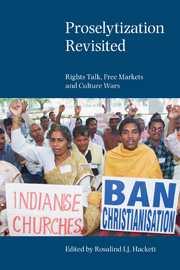Book contents
- Frontmatter
- Contents
- Preface and acknowledgements
- Contributors
- Revisiting Proselytization in the Context of Rights Talk, Free Markets and Culture Wars
- Section I
- Section II
- Section III
- Section IV
- Section V
- Proselytization or Information? Wicca and Internet
- You Can't Talk to an Empty Stomach: Faith-based Activism, Holistic Evangelism, and the Publicity of Evangelical Engagement
- Proselytization: Closing Thoughts from a Sociologist
- Index
Proselytization or Information? Wicca and Internet
from Section V
- Frontmatter
- Contents
- Preface and acknowledgements
- Contributors
- Revisiting Proselytization in the Context of Rights Talk, Free Markets and Culture Wars
- Section I
- Section II
- Section III
- Section IV
- Section V
- Proselytization or Information? Wicca and Internet
- You Can't Talk to an Empty Stomach: Faith-based Activism, Holistic Evangelism, and the Publicity of Evangelical Engagement
- Proselytization: Closing Thoughts from a Sociologist
- Index
Summary
Common conceptions of “proselytization” include forcing one's beliefs upon another in the attempt to coerce that person into adopting one's own religious tradition and ideology, convincing a Christian to change his/her denominational affiliation, and attempting to bring about the conversion of a non-Christian to Christianity (See Kao this volume; Lindholm et. Al. 2004, 668; Stalnaker 2002, 337, 347. In these cases, “proselytism” is not merely the attempt to gain converts, but also includes the endeavor to persuade others to change their beliefs, practices, and/or community affiliations, as well as efforts to “extend ideological influence and political dominance” (Mayer, in this volume).
From this latter perspective, “proselytism” can be understood as quite commonplace in daily life. Although attempting to change the perspectives of others occurs in many aspects of routine conversations and discussions where two opposing opinions meet, the term “proselytism” is generally not used outside of the religious purview. Theologian Lawrence A. Uzzell, in critiquing this ambiguity of the term, recognizes that: “[p]hrases such as ‘feminist proselytism’ or ‘environmental proselytism’ are unknown; it is considered natural, even laudable, for adherents of those secular beliefs to seek converts all over the world” (2004, 14).
Arguably, the historical uses of proselytism by dominant religious traditions are more sophisticated than mere conversion techniques. The term often carries a pejorative connotation, especially for those who are the focus of such efforts, because the practice of proselytism “implies a moral judgment of error (in assent) and impropriety (in action)” on the part of those being proselytized (Griffiths 2002, 31).
- Type
- Chapter
- Information
- Proselytization RevisitedRights Talk, Free Markets and Culture Wars, pp. 409 - 430Publisher: Acumen PublishingPrint publication year: 2008

